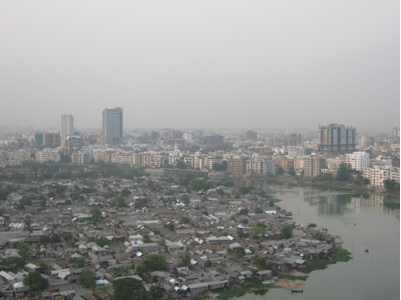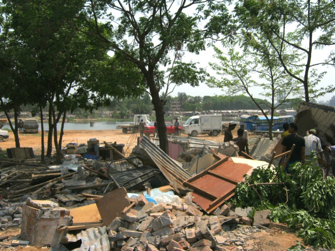April 9th, 2012
By Venita Subramanian and Maria A. May, BRAC’s Social Innovation Lab

Slum sits alongside Gulshan Lake - its 30,000 residents are threatened by eviction. Photo by Ishtiaque Hussain Korail.
On April 4, one of the largest forceful slum evictions in Bangladesh’s history took place in Dhaka’s Korail bustee.
Households and shops within twenty meters of the road were bulldozed, with approximately 2,000 structures affected. Homes lay in complete ruin, while those who could salvage some of their belongings camped on the local field or the road itself.
“Our water supply was cut off and we have no place to go” said one of the affected women. “The way the whole process was carried out was very inhumane. We received an announcement on April 3 and the next day morning, the eviction began. We were given just one night to dismantle our homes, gather our belongings and relocate ourselves. Where will we go?” says another victim.
There are unconfirmed reports of at least one child who died, trapped inside one of the destroyed shacks. Local shops and bazaars, the main sources of food for the community, were closed.
Dhaka is home to over three million slum dwellers, all of whom reside in what are considered illegal structures. According to a research done by the Department for International Development (DFID), at least 60,000 people were displaced due to the evictions from 27 slums in Dhaka between 2006 and 2008. Bangladesh’s success in reducing poverty is threatened by forceful evictions that disrupt communities, destroy livelihoods, and uproot families. BRAC is committed to supporting its community members in Korail with emergency support, and supporting the development of sustainable and humane urban policies.
As the world’s largest NGO, founded in Bangladesh in 1972, BRAC’s community-based health, microfinance, and education programs have been working with Korail’s residents for many years. Thus far, it has been confirmed that eight pregnant women covered by the Maternal, Neonatal, and Child Health program (called Manoshi) and approximately 10 students from BRAC’s primary schools were affected. Over 100 members of BRAC’s microfinance program were displaced.
These devastating activities are part of a larger eviction campaign taken on by the government, which started in various parts of Dhaka five days ago. The steady influx of urban migrants is squeezing a crowded city and land is an increasingly precious and scarce commodity. Slums, which lack any official protection or recognition from the Government of Bangladesh, are often described as hotbeds to nefarious thugs or mastaans, but are also home to rickshaw drivers, household staff, and many children. On the evening of the eviction, nearby streets were filled with families, many crying from their losses and pathetic situation.
“We have created a structure where there is no place but slums for low-income people to live. They are the engine of the informal economy and yet the State likes to pretend that they don’t exist and this is the result of that indifference”, said Asif Saleh, Director of Communication, BRAC.

Bulldozers were driven through and demolished all structures within twenty yards of the road. Photo by Maria May.
In January, the High Court directed the government to demarcate Gulshan Lake and remove all illegal structures, which will include the homes of the approximately 30,000 slum dwellers. Dhaka’s District Executive Magistrate has committed to completing the eviction by June. Despite existing policies requiring evictions to include rehabilitation for slum dwellers, none has been provided. Local NGOs reported that “water, food, and a place to go” were the primary needs they identified. Thousands participated in the peaceful protest to the eviction plans. As the spring rains began over the weekend, plastic sheets were distributed to help families create temporary shelters.
BRAC provided a small cash transfer for 400 households that were left homeless by the eviction. But without increased attention to the lives affected by these evictions, the ability of BRAC and other NGOs to prevent the resulting misery is quite limited. Already reconstruction of the devastated houses has begun, indicating the futility of forced evictions without sufficient attention to the needs of affected communities.
On April 8, BRAC and several other organizations have submitted a demand of justice notice, to ensure that the government is in compliance with the High Court’s requirements of providing adequate notice, compensation, resettlement and rehabilitation to affected households.
“However technically legal the form of the eviction may have been, nothing can justify the fact that the manner and spirit in which it was carried out was fully devoid of humanity. No adequate advance notice was given, no compensation mentioned – and rehabilitation is so distant and unreal a dream that no one even utters it. What a mockery of constitutional safeguards of life, livelihood and shelter.” Faustina Pereira, Human Rights Activist and Director of BRAC’s Human Rights and Legal Services Programme.
Other links:
Personal reflections from BRAC staff
Local English newspaper coverage
Grievous life at korail slum after eviction:
Source: Global Health Hub
For more news on slum evictions in Dhaka, see:
